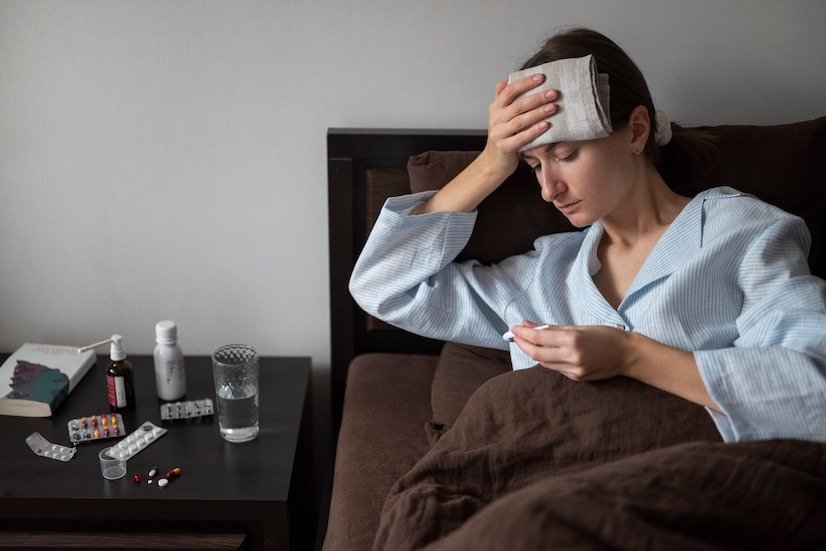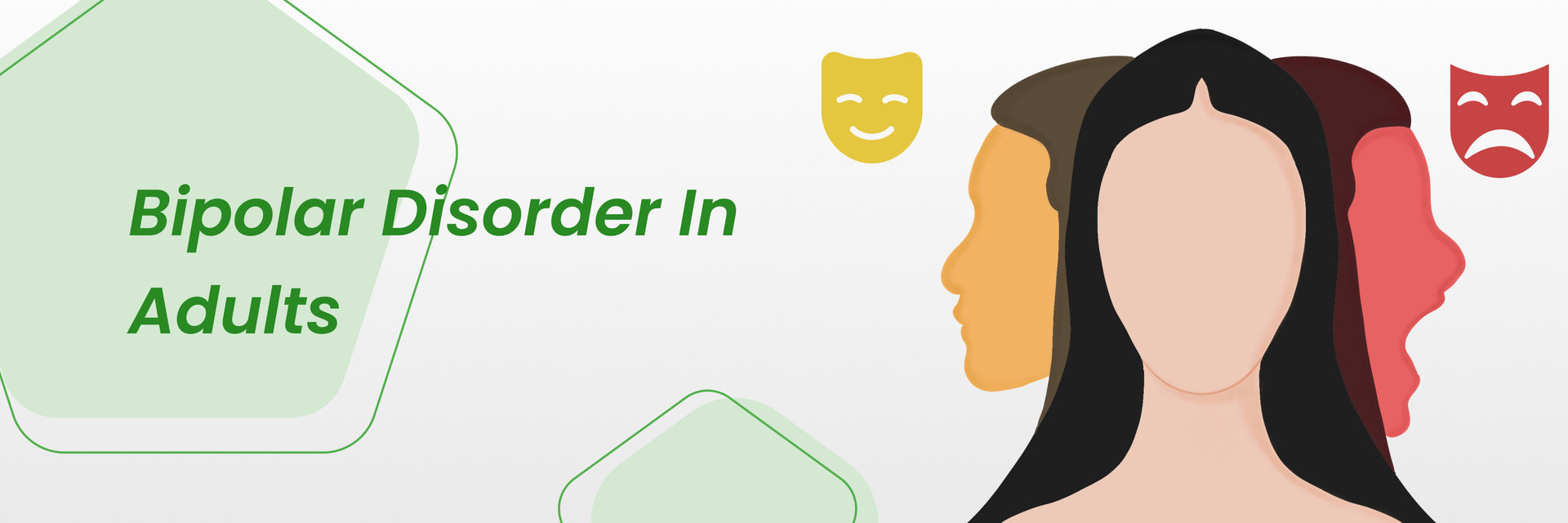Overview
Can menopause cause depression?
Yes, decreasing hormone levels during menopause can lead to menopause-related depression.
Menopause is a natural phase in a woman's life, marking the end of menstrual cycles. However, the hormonal changes during this period can significantly impact mental health. Decreasing levels of estrogen and progesterone can lead to mood swings, anxiety, and depression. According to the World Health Organization, approximately 25% of women experience depression during menopause. Additionally, the International Menopause Society reports that about 47% of women going through menopause experience mood changes.
Understanding these changes and their effects is crucial for managing and reducing symptoms, and ensuring better mental health and well-being.
If you are going through similar condition, talk to your healthcare provider or reach out to a psychiatrist about managing menopause-related depression.
Understanding Menopause and Depression
What is Menopause?
Menopause is a natural process marking the end of a woman's menstrual cycle. It occurs in women in their late 40s to early 50s and is confirmed after 12 months without a period. During menopause, the ovaries produce less estrogen and progesterone.
Dr. Vikas Patel, a top psychiatrist in Ludhiana, states, "Many women experience significant mood changes during menopause due to hormonal fluctuations. It's essential to recognize these symptoms early and seek appropriate treatment to manage them effectively. Approximately 1 in 4 women experiences depression during this transition."
Have you ever wondered why menopause can sometimes lead to depression? Lets read !
Why Menopause Can Cause Depression?
Menopause can lead to depression due to hormonal fluctuations, sleep problems, and life changes.
Hormonal Fluctuations
- Estrogen and Progesterone Drop: These hormones influence serotonin, which affects mood.
- Impact: Lower serotonin can lead to depression symptoms.
Sleep Problems
- Common Issues: Insomnia, night sweats, and disrupted sleep.
- Impact: Poor sleep can worsen mood and increase depression risk.
Life Changes
- Common Stressors: Empty nest, aging parents, career changes, health issues.
- Impact: These changes add emotional stress, contributing to depression.
Wondering if your symptoms could be related to menopause?
Symptoms of Menopause-Related Depression

Common Symptoms
Persistent Sadness
- Feeling sad or down without a clear reason.
Irritability
- Experiencing frequent or intense irritability and mood swings.
Sleep Disturbances
- Trouble falling asleep, staying asleep, or experiencing restful sleep.
Fatigue
- Constant tiredness or lack of energy, even after adequate rest.
Differentiating from Regular Depression
While the symptoms of menopause-related depression and regular depression can overlap, there are some key differences:
- Hormonal Triggers: Menopause-related depression is often triggered by hormonal changes specific to this phase of life.
- Age of Onset: Menopause-related depression occurs in women in their late 40s to early 50s, coinciding with the menopausal transition.
- Additional Symptoms: Menopause-related depression may also include physical symptoms like hot flashes and night sweats.
If you are experiencing these symptoms, Talk to us today to discuss the best treatment options for managing menopause-related depression.
Conventional Treatments for Menopause Depression

What are the proven medical treatments for menopause-related depression?
Managing menopause-related depression often involves a combination of medications and therapies. Here are some effective conventional treatments.
Antidepressant Medications
SSRIs (Selective Serotonin Reuptake Inhibitors)
- Common Examples: Prozac (fluoxetine), Zoloft (sertraline), and Lexapro (escitalopram).
- How They Work: SSRIs increase serotonin levels in the brain, which can help improve mood and reduce depression symptoms.
- Benefits: Effective in reducing depressive symptoms and often prescribed as a first-line treatment.
SNRIs (Serotonin-Norepinephrine Reuptake Inhibitors)
- Common Examples: Effexor (venlafaxine), Cymbalta (duloxetine), and Pristiq (desvenlafaxine).
- How They Work: SNRIs increase both serotonin and norepinephrine levels, which can help improve mood and energy levels.
- Benefits: Effective for treating depression and may also help with anxiety and chronic pain.
Please note: consumption of any medications without a prescription from a certified medical professional is strictly prohibited.
Hormone Replacement Therapy (HRT)
Benefits and Risks
- Benefits:
- Mood Improvement: HRT can help stabilize mood by replenishing estrogen levels.
- Relief from Menopausal Symptoms: Can reduce hot flashes, night sweats, and other physical symptoms of menopause.
- Risks:
- Increased Health Risks: Long-term use of HRT has been linked to an increased risk of breast cancer, blood clots, and stroke.
- Not Suitable for All: Women with certain health conditions, such as a history of blood clots or certain cancers, may not be candidates for HRT.
Consult your specialist to discuss the best treatment options for managing menopause-related depression. Get in touch with us
Alternative and Holistic Treatments
Are you looking for natural ways to manage menopause related depression?
Also to conventional treatments, alternative and holistic approaches can help manage menopause-related depression. Here are some effective methods:
Lifestyle Changes
Diet and Nutrition
- Phytoestrogens: Foods like soy, flaxseeds, and tofu can help balance hormone levels.
- Probiotics: Yogurt and fermented foods support gut health, which can impact mood.
- Tryptophan-Rich Foods: Nuts, and seeds boost serotonin production, helping improve mood.
Regular Exercise
- Physical Activity: Activities like walking, jogging, and yoga release endorphins, which can enhance mood and reduce symptoms of depression.
- Consistency: Aim for at least 30 minutes of moderate exercise most days of the week.
Stress Reduction Techniques
- Meditation: Practicing mindfulness meditation can reduce stress and improve mental well-being.
- Yoga: Combines physical postures, breathing exercises, and meditation to enhance mood and reduce anxiety.
- Acupuncture: This traditional Chinese practice can help balance energy levels and reduce stress.
Psychotherapy and Counseling
Can talking to a therapist help?
The answer is YES!

Psychotherapy and counseling are effective treatments for menopause-related depression. These therapies provide a safe space to explore feelings, understand triggers, and develop coping strategies.
"Talk therapy offers invaluable support by providing a safe space for individuals to explore their thoughts, emotions, and experiences. As a psychiatrist, I firmly believe in the power of talking therapy to facilitate healing and growth. Through compassionate listening and evidence-based techniques, we can help individuals through life's challenges, manage mental health conditions, and foster resilience. Seeking therapy is a courageous step towards self-discovery and emotional well-being", says Dr. Vikas Patel
Cognitive Behavioral Therapy (CBT)
What is CBT?
- Focus: CBT helps individuals identify and change negative thought patterns and behaviors.
- Techniques: Involves practical strategies like setting goals, problem-solving, and stress management.
- Benefits: Proven to reduce symptoms of depression and anxiety, and improve mental health.
How does it help with menopause depression?
- Addressing Mood Swings: CBT can help manage the emotional ups and downs caused by hormonal changes.
- Improving Sleep: Techniques learned in CBT can improve sleep hygiene, reducing insomnia and fatigue.
What is IPT?
Interpersonal Therapy (IPT)
- Focus: IPT addresses interpersonal issues that can contribute to depression, such as relationship conflicts and social role changes.
- Techniques: Includes communication skills training, conflict resolution, and social support enhancement.
- Benefits: Effective in treating depression by improving relationships and social functioning.
How does it help with menopause depression?
- Managing Life Changes: IPT helps navigate life transitions that often occur during menopause, like empty nest syndrome or career changes.
- Building Support Networks: Enhances social support, which is crucial for emotional well-being during menopause.
Consider speaking with a therapist to explore how psychotherapy and counseling can help manage menopause-related depression. schedule your appointment now.
How do you handle side effects from treatments?
Managing Side Effects
Managing side effects is crucial for maintaining well-being while treating menopause-related depression.
Tips for Managing Medication Side Effects
- Monitor Symptoms: Keep a diary of side effects and discuss them with your healthcare provider.
- Adjust Medication: Sometimes, changing the dose or switching medications can help reduce side effects.
Adjusting Lifestyle Habits
- Healthy Diet: Eat balanced meals rich in phytoestrogens, probiotics, and tryptophan.
- Exercise: Engage in physical activities like walking, yoga, or swimming to boost mood and energy levels.
- Stress Reduction: Practice stress management techniques such as meditation, deep breathing, and mindfulness.
Conclusion
Ready to take control of your menopause depression? Talk to us today.
Menopause-related depression can be managed with the right treatments and lifestyle changes. It's important to consult healthcare providers to find the best approach for you. Understanding the impact of menopause on mental health and exploring both conventional and holistic treatments can help improve your quality of life.
Reference
https://www.medicalnewstoday.com/articles/menopause-and-depression






